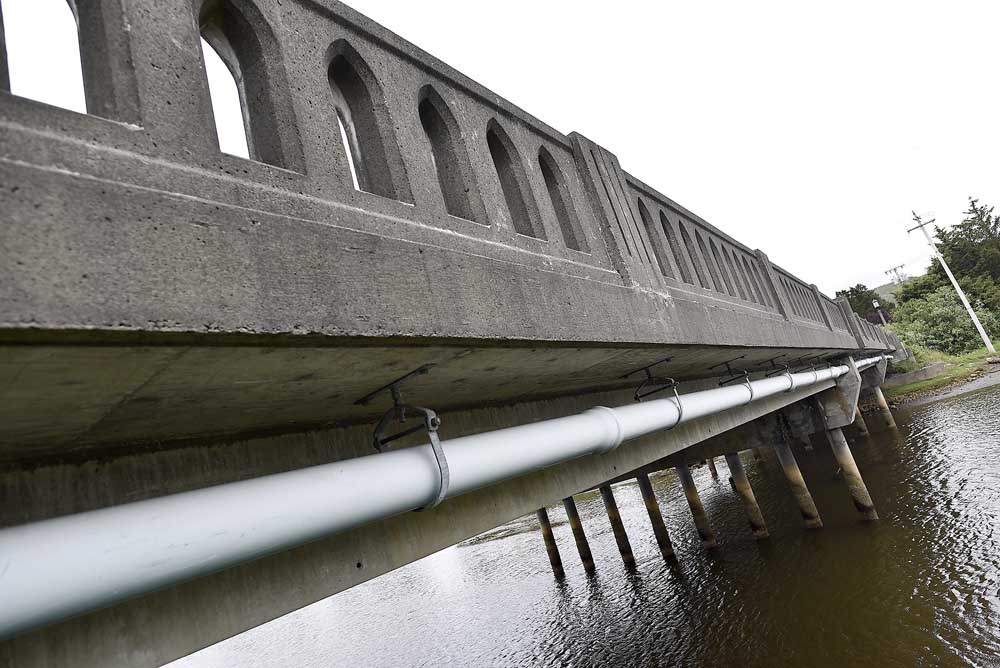Seaside lukewarm on lodging tax hike for bridges
Published 5:19 am Tuesday, July 31, 2018

- One of the bridges over 12th Street in Seaside is an example of infrastructure in the area that could fail in an earthquake.
SEASIDE — While the City Council agreed making Seaside’s bridges more seismically sound is a priority, most councilors are hesitant to use lodging tax dollars to pay for it.
At a workshop about tsunami preparedness Monday, City Councilor Tom Horning pitched raising the lodging tax by 2 percent to quickly pay for retrofitting seven bridges and build two pedestrian bridges over 20 years to withstand a Cascadia Subduction Zone earthquake.
Trending
Horning, a geologist, argues investing in bridges that will act as evacuation routes out of the tsunami inundation zone is the best way to save the most lives. The predicted 25-foot to 50-foot wave would destroy about 92 percent of Seaside’s buildings, leaving about 20 to 30 feet of standing water throughout the town. The disaster could cause anywhere from 500 to 23,500 fatalities, depending on the time of year and how prepared the town is to respond, Horning said.
Projected to cost about $35 million, Horning sees lodging taxes as a quick way to raise about $1 million a year to help finance bridge repairs.
While the sense of urgency resonated, some city councilors questioned the legality and feasibility of using lodging taxes.
State law requires 70 percent of lodging tax revenue be used for tourism promotion or property. Raising the lodging tax to pay for infrastructure improvements has been contested by hoteliers and the Oregon Restaurant & Lodging Association.
There was also concern about how it would pair with the lodging tax increase passed by Clatsop County that would fund operations at a new jail, and how steadily increasing hotel bills would affect the tourism industry.
Terry Bichsel, owner of Best Western Plus Ocean View Resort and Rivertides Suites Hotel, said as a lodging operator, he recognized the need for disaster preparation, but felt the cost should be shared by the community.
“The lodging tax is an easy target, but I would encourage spreading the responsibility,” Bichsel said.
Some councilors felt Seaside’s lodging tax, which is 10 percent, is already reaching a breaking point. Seaside’s rate is the third highest in the county, following Warrenton and Astoria, which sit at 12 percent and 11 percent.
“We have to stop looking at lodging taxes as a panacea,” City Councilor Tita Montero said. “If we keep raising lodging taxes out of the norm, we will lose those tourists that we think will keep coming to fund this.”
Some councilors, like Seth Morrisey, supported using revenue the county will share with cities from the new lodging tax for bridge projects in conjunction with other revenue sources.
Horning said he supports getting creative to find funding, but feels the impact of raising the lodging tax was being overstated.
“I don’t like to raises taxes for nothing, but it’s quite small in comparison to the need,” he said.
The City Council discussed possibly floating a bond or road levy and lobbying the state for higher priority for funding given the town’s unique status as the most vulnerable to a tsunami on the Oregon Coast. Other ideas included instituting a fee on resident’s water bills to help fund an emergency preparedness consultant.
Some, like City Councilor Dana Phillips and Mayor Jay Barber, questioned whether more attention should be directed on resilience after the wave subsides.
But one consensus was reached: Something needs to be done — fast.
“We need to address this soon,” Barber said. “We don’t have an answer to funding, but once you’re aware, you’re responsible.”






